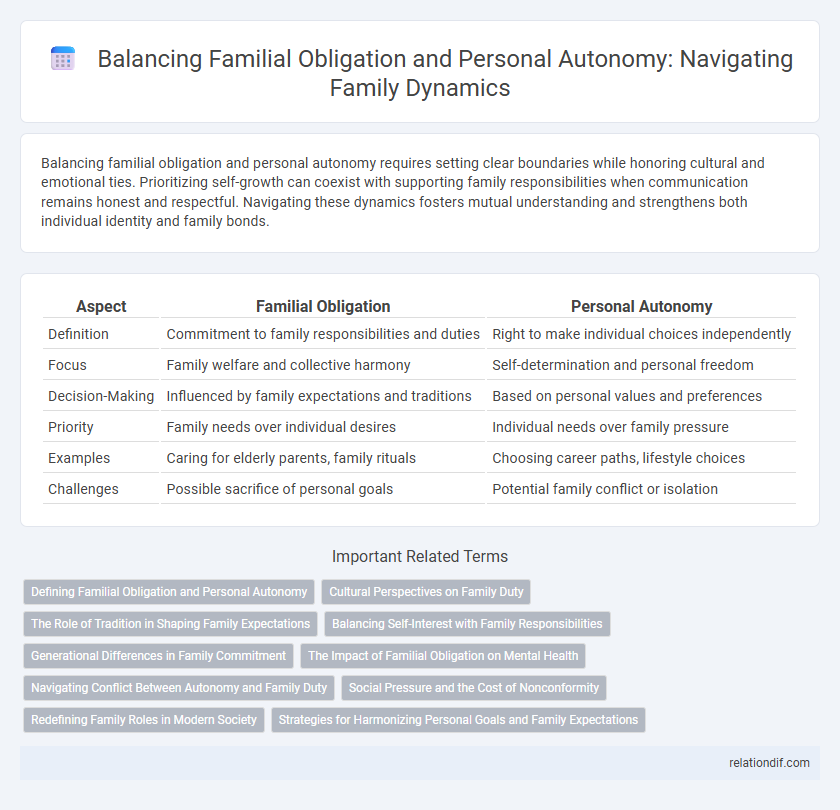Balancing familial obligation and personal autonomy requires setting clear boundaries while honoring cultural and emotional ties. Prioritizing self-growth can coexist with supporting family responsibilities when communication remains honest and respectful. Navigating these dynamics fosters mutual understanding and strengthens both individual identity and family bonds.
Table of Comparison
| Aspect | Familial Obligation | Personal Autonomy |
|---|---|---|
| Definition | Commitment to family responsibilities and duties | Right to make individual choices independently |
| Focus | Family welfare and collective harmony | Self-determination and personal freedom |
| Decision-Making | Influenced by family expectations and traditions | Based on personal values and preferences |
| Priority | Family needs over individual desires | Individual needs over family pressure |
| Examples | Caring for elderly parents, family rituals | Choosing career paths, lifestyle choices |
| Challenges | Possible sacrifice of personal goals | Potential family conflict or isolation |
Defining Familial Obligation and Personal Autonomy
Familial obligation encompasses the responsibilities and duties individuals hold towards their family members, often rooted in cultural, social, and ethical expectations. Personal autonomy refers to an individual's right to make independent decisions and pursue their own goals without undue influence from family pressures. Balancing these concepts requires understanding how duty to family intersects with the pursuit of self-determination and individual freedom.
Cultural Perspectives on Family Duty
Cultural perspectives on family duty vary significantly across societies, influencing the balance between familial obligation and personal autonomy. In collectivist cultures such as those in East Asia and Latin America, strong emphasis on filial piety and intergenerational support often prioritizes family needs over individual desires. Conversely, individualistic cultures like those in North America and Western Europe tend to value personal autonomy and self-fulfillment, sometimes leading to a redefinition of traditional family roles and responsibilities.
The Role of Tradition in Shaping Family Expectations
Tradition plays a pivotal role in shaping family expectations, often dictating specific duties and behaviors that members are culturally obliged to uphold. These inherited norms create a framework where familial obligation frequently supersedes personal autonomy, emphasizing collective responsibility over individual desires. Navigating the tension between honoring established customs and pursuing personal freedom remains a central challenge in contemporary family dynamics.
Balancing Self-Interest with Family Responsibilities
Balancing self-interest with family responsibilities requires setting clear boundaries while prioritizing essential familial duties such as caregiving and emotional support. Effective communication fosters mutual understanding, enabling individuals to pursue personal goals without neglecting collective obligations. Maintaining this equilibrium promotes long-term family cohesion and individual well-being.
Generational Differences in Family Commitment
Generational differences in family commitment reveal varying balances between familial obligation and personal autonomy, with older generations often prioritizing collective responsibility and younger generations emphasizing individual choice and self-expression. Studies show Millennials and Gen Z value setting boundaries and pursuing personal goals more than Baby Boomers, who typically uphold traditional expectations of caregiving and loyalty. Cultural shifts, economic factors, and evolving social norms contribute to these contrasting attitudes toward family obligations across generations.
The Impact of Familial Obligation on Mental Health
Familial obligation often imposes significant emotional stress, leading to anxiety and depression as individuals struggle to meet cultural and social expectations. The constant pressure to prioritize family duties can erode personal autonomy, diminishing self-esteem and increasing feelings of entrapment. Research indicates that balancing these demands is crucial for maintaining mental well-being and preventing long-term psychological distress.
Navigating Conflict Between Autonomy and Family Duty
Balancing personal autonomy with familial obligation often requires clear communication and setting boundaries to respect individual choices while honoring family responsibilities. Navigating this conflict involves recognizing cultural expectations and emotional ties that influence decision-making within family dynamics. Prioritizing mutual understanding fosters a harmonious coexistence where personal freedom and family duty coexist without undermining each other.
Social Pressure and the Cost of Nonconformity
Social pressure within family structures often enforces conformity, compelling individuals to prioritize familial obligations over personal autonomy. The cost of nonconformity can manifest as emotional alienation, loss of support networks, or reputational damage within the community. Navigating these dynamics requires balancing individual desires with collective expectations to maintain both self-identity and familial harmony.
Redefining Family Roles in Modern Society
Redefining family roles in modern society involves balancing familial obligations with personal autonomy, reflecting evolving cultural values and individual aspirations. Traditional expectations of caregiving and loyalty coexist with growing emphasis on self-fulfillment and independence, challenging normative structures. This dynamic interplay fosters diverse family models that prioritize communication, mutual respect, and negotiated responsibilities.
Strategies for Harmonizing Personal Goals and Family Expectations
Balancing familial obligation with personal autonomy requires clear communication and setting boundaries that respect both individual aspirations and family values. Prioritizing mutual understanding fosters collaboration when negotiating responsibilities and personal goals, ensuring that neither is compromised. Implementing flexible arrangements and shared decision-making can effectively harmonize conflicting expectations while maintaining strong family bonds.
familial obligation vs personal autonomy Infographic

 relationdif.com
relationdif.com